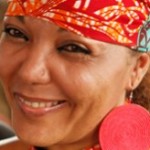Victors Not Victims: Women Driving Social Change and Striving for Peace in Conflict Zones
Speakers
-
Executive Director, Elman Peace and Human Rights Centre
Fartuun Adan is the Executive Director of Elman Peace and Human Rights Centre, an NGO based in Somalia. The organisation she leads works in the areas of Human Rights, Peace Building, Development, Rehabilitation and Reintegration of Child Soldiers. The organisation’s headquarters is located in Mogadishu, Somalia, where she established the first rape crisis centre. Fartuun works actively towards gender justice and prevention of gender based violence.
-
Director, Salmmah Women Resource Center
Fahima Abdel Hafiz Hashim is a women’s rights defender and activist, researcher and trainer. She serves as the Director for Salmmah Women’s Resource Centre. Fahima has a Masters in Documentation and Library Sciences, Bayero University Kano, Nigeria and has over 25 years of experience in the area of gender and development, with a special emphasis on women's rights and sexuality, violence against women and peace-working with women youth in conflict and post conflict situations. Fahima is well connected with the African women’s movement.
-
Playwright, V-Day
Eve Ensler is a Tony Award-winning playwright, performer and the Founder of V-Day, the global movement to end violence against women, which has raised $85 million. Her play, The Vagina Monologues, has been published in 48 languages and performed in 140 countries. Eve’s newest work, I Am An Emotional Creature, made the Best Seller list and, following workshops in Johannesburg and Paris, will open in Berkeley, California in June, moving off-Broadway in the Fall. Her next book, In The Body of the World, is due out in 2013.
-

Co-Founder/Editorial Director TEDWomen; Managing Partner, Connected Women Leaders, Pat Mitchell Media
Throughout her career as an award-winning journalist, producer and media executive, Pat Mitchell broke new ground for women as the first woman President of PBS and of CNN Productions. Today, Pat is a co-founder, host and curator for TEDWomen and co-founder and managing partner of ConnectedWomenLeaders, a cohort of global women leaders, across generations and geography, who are launching a global, women-led campaign for climate justice titled Project Dandelion. She is Chair Emeritus of the Sundance Institute
and just received the Vanguard Award for philanthropy. She also serves on the board of The Skoll Foundation, Participant Media, The Woodruff Arts Center, and the VDAY movement to end violence; she’s also a member of CARE’s Global Advisory Council and Chair Emeritus of the Women’s Media Center which established an annual award in her name. In her memoir, “Becoming a Dangerous Woman,” Mitchell shares her journey as a frontline advocate for a just, equitable and sustainable world.
-

Director, City of Joy
Christine Schuler Deschryver is Co-Founder and Director of the City of Joy and V-Day Congo Director and the national coordinator of “one billion rising”. She is also the vice President of Panzi Foundation DRC. Christine has called Bukavu her home all her life. As Director of V-Day Congo, City of Joy, and VWorld farm, she oversees all aspects of V-Day’s work on the ground in the DRCongo, including the City of Joy and coordinating campaign activities on the local, provincial, and national levels. After her best friend was murdered in 1998, Christine devoted her life to the women of DRCongo and to ending ‘sexual terrorism.’ She is an internationally renowned human rights activist who has worked as a teacher, an administrator for CARE CANADA, and for 13 years during the wars, she was responsible for the German Technical Cooperation (all the projects in eastern DRC), where she oversaw during the war a staff of over 300. She was named one of The Guardian’s Women of the Year for 2011 and travels widely advocating for Congolese women’s rights and the plundering of DRC. She did the first documentary «Congo, un combat pour la vie» France 2 envoyé spécial in 2003 to denounce the silent genocide in DRC and did many others after the success of it.